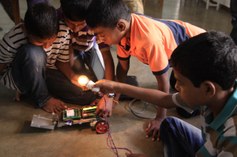Impact success story: Robotics
Already as a child, Francis Wyffels wanted to build robots. Now he gives that chance to other young people.
Francis is a professor at the Ghent University IDLab and conducts fundamental research into robotics and artificial intelligence (AI). He builds robots, for example for a project trying to teach robots to fold laundry. “We adjust the robot, because if you want to give it hands, for example, you will find standard simple pinchers, which can grip by opening and closing, but have very little feeling.” Because it’s more difficult to install sensors in the fingertips of a robot, most systems use vision. Francis would rather adjust the hardware: he makes his own fingers and teaches them robot tasks through AI. By having people perform certain actions, the robot can learn in environments that require a great deal of adaptability, intelligence and creativity. “It’s not about repetitive actions,” points out Francis, but about tasks, “the next step as it were: tasks that still require some form of adaptability from humans today, or from the robot in the future.”
Teaching robots something
This can of course also be commercialised in the long term. Francis Wyffels talks about a horizon of at least ten years. “Our research is a bit more fundamental, for example on the question of how we can improve machine learning or AI so that applications can be used with it in the future. Think of picking fruit, folding laundry or cooking. It’s not that we have a task-driven focus per se, but we do want to stay grounded in reality, meaning that we work on actions around which we can collect data and where we can involve people in the research.”
Robots can handle repetitive tasks, but for unpredictable things you need a bit more ‘feeling’ and a measure of environmental awareness. This is much more complex because it also requires the development of hardware. That will take longer, but it is coming, because robots will eventually be able to do many of the tasks that we now think it can’t. This will have consequences for society as a whole, for example in terms of employment.
“People are already using computers in chess to analyse the moves that people make. If the moves are very creative, it is assumed that it was a computer,” says Francis. “We as human beings must not think that we alone can be creative. It’s up to society to find answers to this, and more research into technology is not the only way.”
“It’s of course important that people have a good understanding of what you can and cannot do with technology. And now we come to the education part of the story.”
Dwengo

Fortunately, there are many initiatives that organise activities around robots, such as robot tournaments. According to Francis, however, they reach a limited group of young people. Sometimes the activities are too expensive, or people do not find enough volunteers to lead them. Young people from vulnerable groups in particular fall through the cracks. That’s precisely why Dwengo focuses on schools and teachers.
Francis: “I strongly believe that you can reach more people by working within school walls.”
For projects that Dwengo carries out itself, the non-profit organisation even goes one step further and explicitly imposes inclusion criteria. “By just being satisfied when your activity attracts enough people, you create a bubble and work with young people who are already interested by themselves. This is exactly what we want to go beyond.”